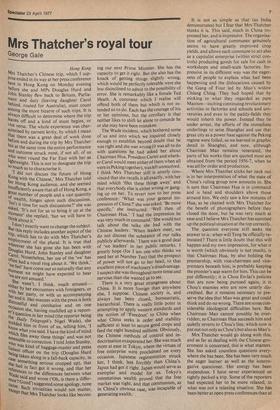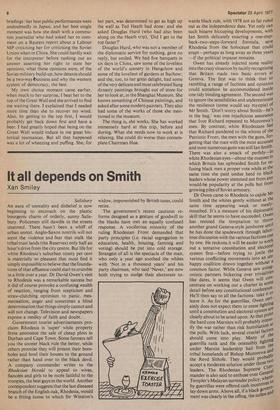Mrs Thatcher's royal tour
George Gale
Hong Kong Mrs Thatcher's Chinese trip, which I supPose ended in its way at her press conference here in Hong Kong on Monday evening before she and MPs Douglas Hurd and John Stanley flew back to Britain, Parliament and duty (leaving daughter Carol behind, routed for Australia), must count among the more bizarre of such trips. It is always difficult to determine where the trip leaves off and a kind of stunt begins, or vice versa. The whole experience was characterised by earnest levity, by which I mean that there was a great deal of work done before and during the trip by Mrs Thatcher but at the same time the entire performance and outcome struck most, if not all, of us i‘1/4: he went round the Far East with her as lightWeight, This is not to denigrate the trip somuch as to characterise it.
,
did not discuss the future of Hong Kong with the Chinese,' Mrs Thatcher told her Hong Kong audience, and she seemed insufficiently aware that all of Hong Kong, a great number of people and a vast quantity ,nf wealth, hinges upon such discussions. isn't it time for such discussions ?' she was asked. 'It's not for us to bring it up at the ra9rnent' she replied, 'but we will have to think about it.' I don't exactly want to change the subject. t this reply includes another aspect of the trip, which has to do with Mrs Thatcher's employment of the plural. It is true that wherever she has gone she has been with Cuftglas Hurd, John Stanley and daughter ,,arol. Nonetheless, her use of the 'we' has ?nen had a royal ring about it. 'We think,, we feel have come out so naturally that any In°Inent we might have expected to hear we are not amused.' She wasn't, I think, much amused— either by by her encounters with foreigners, or with her party, or with us accompanying her and it. Her manner with the press is both oigastrustful and combative and on one re,cas ion she, having muddled up a reporth s question in her mind (the reporter being e bail!' Telegraph's Nigel Wade), she Scolded him in front of us, telling him, 'I know what you said. I have the kind of mind w A,,ich files away these things' and was not —"enable to correction. I told John Stanley, Who was kind of baggage-master and press ,!son officer on the trip (Douglas Hurd 'e-les_ing taken along in a fall-back capacity, in sdrnething serious cropped up), that ie had in fact got it wtong, and that her references to the differences between what Nwade said and wrote (`Oh, is there a differflee? Good') Good') suggested some apology, none eine. Such trivialities would not matter, keePt that Mrs Thatcher looks like becom ing our next Prime Minister. She has the capacity to get it right. But she also has the knack of getting things slightly wrong, which would be perfectly tolerable were she less disinclined to admit to the possibility of error. She is remarkably like a female Ted Heath. A comment which 1 realise will offend both of them but which is not intended so to do. Each has the courage of his or her opinions, but the corollary is that neither likes to shift let alone to concede he or she may have been mistaken.
The Wade incident, which bothered some of us and into which we inquired closely enough to establish beyond doubt that he was right and she was wrong (it was all to do with questions he had asked her about Chairman Hua, President Carter and whether Carol would meet either of them when all were in Peking together), was left unresolved. I think Mrs Thatcher still is utterly convinced that she recalls it all exactly, with her mind which 'files these things away' and that everybody else is either wrong or ganging up on her. To revert now to her press conference: 'What was your general impression of China?' she was asked. 'Be more specific,' she instructed. 'Well then of Chairman Hua."1. had the impression he was very much in command.' She would not talk about the talks she had with the Chinese leaders: 'When leaders meet, we do not discuss the substance of our talks publicly afterwards.' There was a good deal of 'we leaders' in her public remarks. I greatly hope (for I am one who thinks we need her at Number Ten) that the prospect of power will not go to her head, to that excellent piece of machinery's disadvantage. I suspect she was throughout more tense and nervous than she wanted us to see.
There is a very great strangeness about China. It is more foreign than anywhere else, I suppose. Chinese society is, and always has been closed, bureaucratic, hierarchical. There is really little point in attempting to apply western standards and the notion of 'Freedom' to China when what China seeks is order and stability sufficient at least to secure good crops and feed the eight hundred millions. Obviously, the Chinese methods of control and indoctrination exasperated her. She was much more at ease in Tokyo, where the virtues of free enterprise were proclaimed on every occasion. Japanese regimentation struck her, I think, less forcibly than China's. Japan had got it right. Japan would serve as exemplar and model for us. Tokyo's ostentatious wealth proved that the free market was right, and that communism, as in China's obvious case, was incapable of generating wealth.
It is not as simple as that (as India demonstrates) but I fear that Mrs Thatcher thinks it is. This said, much in China impressed her, and is impressive. The organisation of agricultural communes genuinely seems to have greatly improved crop yields, and allows each commune to act also as a capitalist enterprise (within strict controls) producing goods for sale for cash in workshops and small-scale factories. Impressive in its different way was the eagerness of people to explain what had been happening and the dislocations caused by the Gang of Four led by Mao's widow Chiang Ching. They had hoped that by sticking to what they regarded as pure Maoism—inciting continuing revolutionary activities in factories and schools and universities and even in the paddy-fields they would inherit the power. Instead they lie under arrest, the efforts of the immediate underlings to seize Shanghai and use that great city as a power base against the Peking regime were foiled, as we learned in graphic detail in Shanghai, and now, although Chairman Mao remains venerated, the parts of his works that are quoted most are obtained from the period 1956-7, when he was all for order and production.
Where Mrs Thatcher sticks her neck out is in her interpretation of what the state of China's ruling group now amounts to. She is sure that Chairman Hua is in command and is head and shoulders above those around him. We only saw a few minutes of Hua, as he chatted with Mrs Thatcher for the benefit of photographers before they closed the door, but he was Very much at ease and I believe Mrs Thatcher has summed up the political situation at the top correctly.
The question everyone still seeks the answer to is: when will Teng be officially reinstated ? There is little doubt that this will happen and my own impression, for what it is worth (which obviously is not much), is that Chairman Hua, by also holding the premiership, with vice-chairmen and vicepremiers beneath him, is probably keeping • the premier's seat warm for him. This can be put differently; it is Chou En-lai's policies that are now being pursued again, it is Chou's enemies who are now utterly discredited. But it remains necessary to preserve the idea that Mao was great and could think and do no wrong. There are some considerable ideological difficulties here. But Chairman Mao cannot possibly be overridden, so Chairman Hua succeeds him and quietly reverts to Chou's line, which now is ' put out not only as Chou's but also as Mao's.
Mrs Thatcher would go along with this, and as far as dealing with the Chinese government is concerned, this is what matters. She has asked countless questions everywhere she has been. She has been very much the eager learner as well as the interrogative questioner. Her energy has been stupendous. 1 have never experienced so tightly packed a trip. Some of the reporters had expected her to be more relaxed, in what was not a relaxing situation. She has been better at open press conferences than at briefings : her best public performances were undoubtedly in Japan, and her best single moment was how she dealt with a communist journalist who had asked her to comment on a Reuters report about a Labour MP criticising her for criticising the Soviet Union when in China. She could hardly wait for the interpreter before rushing out an answer asserting her right to state her opinions, what those opinions were, of the Soviet military build-up, how détente should be a two-way dbusiness and why the western system of democracy, the best.
My own choice moment came earlier, when much to her surprise, I beat her to the top of the Great Wall and she arrived to find me waiting there, I explained that I needed more time than she to recover my wind. Also, by getting to the top first, I would probably get back down first and have a beer. I had greatly hoped that being on the Great Wall would induce in me great historical resonances. But all that happened was a lot of wheezing and puffing. She, for her part, was determined to get as high up the wall as Ted Heath had done: and she asked Douglas Hurd (who had also been along on the Heath trip), 'Did I get to the top faster?'
Douglas Hurd, who was not a member of the diplomatic service for nothing, gave no reply, but smiled. We had five banquets in six days in China, saw some of the loveliest of the world's scenery in Hangchow and some of the loveliest of gardens at Suchow: and she, too, to her great delight, had some of the very delicate and most celebrated Sung dynasty paintings brought out of store for her to look at, in the Shanghai Museum. She knows something of Chinese paintings, and asked after some modern painters. They also had some of the works of those she mentioned in the museum.
The thing is, she works. She has worked immensely hard at this trip, before and during. What she needs now to work at is relaxing. She could do worse than contemplate Chairman Hua.



































 Previous page
Previous page